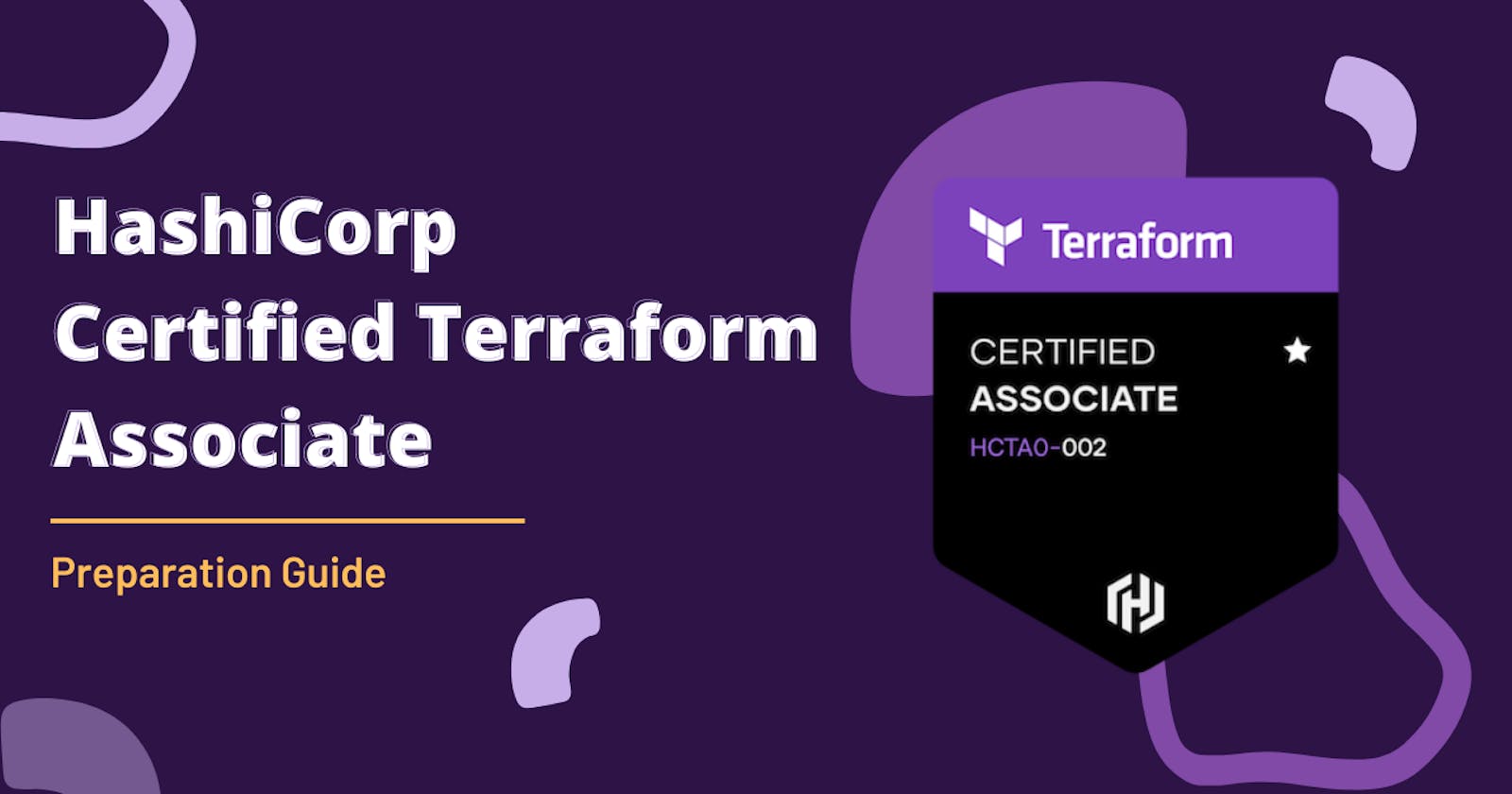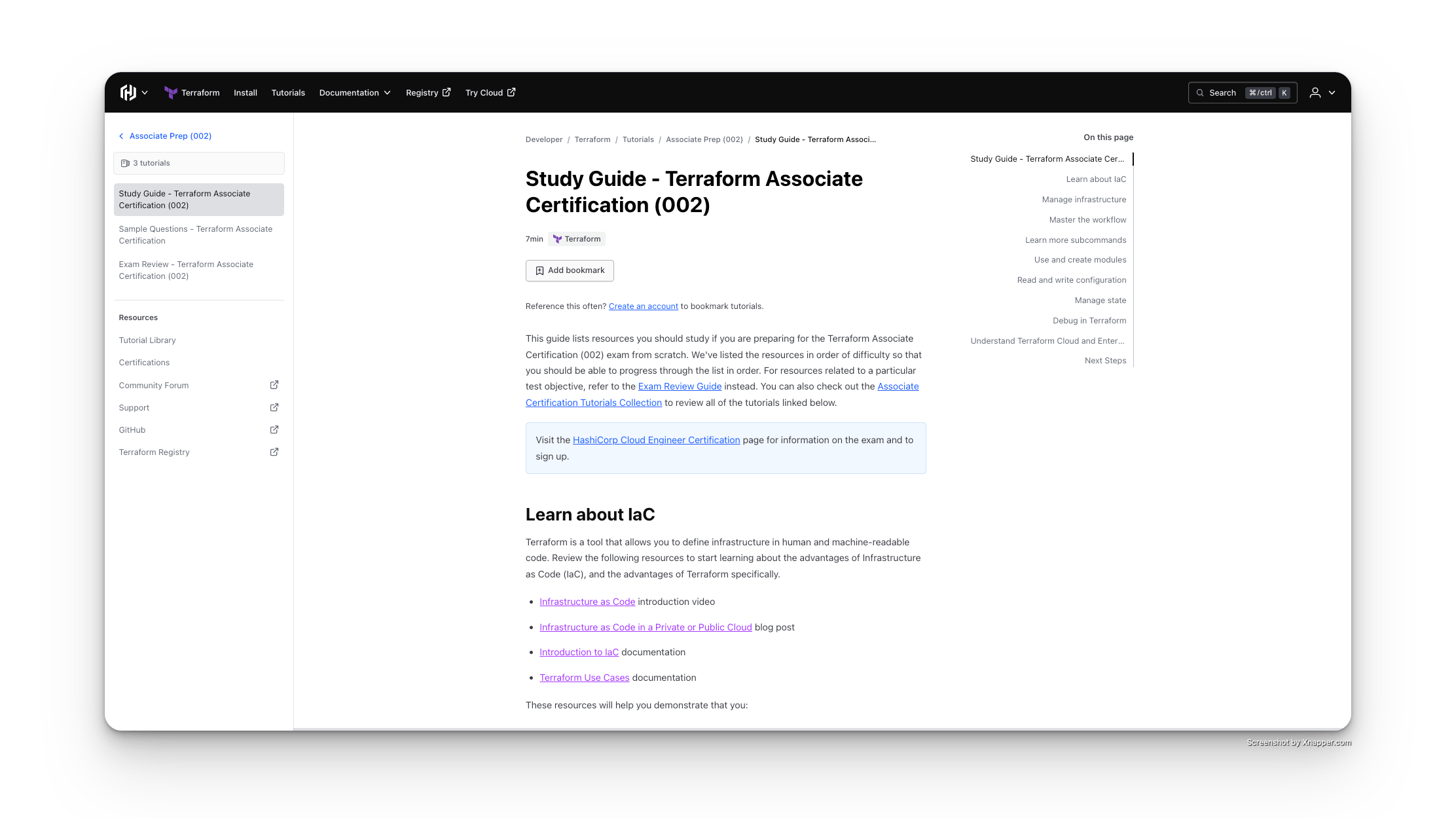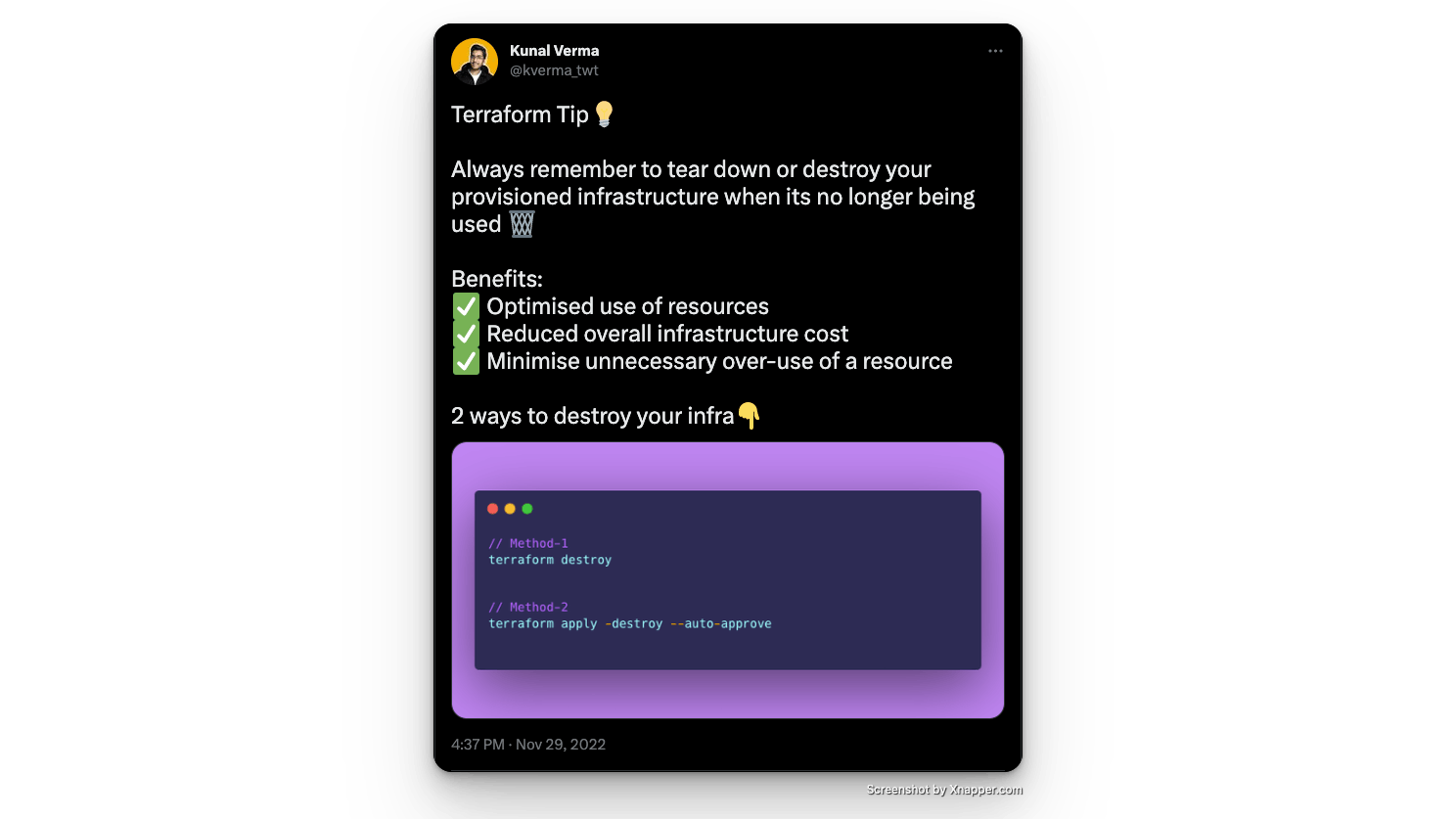Introduction
Recently, I appeared for the HashiCorp Certified Terraform Associate exam after somewhere around 2 months of preparation. I am very glad to share that I passed it with a score of 85%, which is a pretty nice one considering the fact that, it is my very first certification in the DevOps ecosystem.
Now, in this particular blog, we'll dig a bit deeper into this certification, and what exactly you need to pass it and I'll be sure to share my tips and experience along the way.
So, if you are someone looking forward to preparing or give this exam in the coming future, you are in the right place today!
Getting familiar with IaC and Terraform
Before we even start to discuss the exam, it's important to be familiar with the technology around which this certification revolves, which is Terraform.
If we look at the official definition of Terraform by HashiCorp, it says that:
HashiCorp Terraform is an infrastructure as a code tool that lets you define both cloud and on-prem resources in human-readable configuration files that you can version reuse, and share.
According to me, this is a very precise definition of Terraform, but there are a few terms here that we need a bit more clarity on. Let's start with the most basic one, What is Infrastructure as Code? Infrastructure as Code (IaC), as the name suggests is an approach to managing your cloud-native infrastructure through code. Traditionally, If we talk about managing our infrastructure over different cloud providers or on-prem platforms, there was heavy use of the UI or some kind of management console to make changes, monitor and troubleshoot the resource throughout the entire application lifecycle. This was apt if we didn't have to manage large-scale infrastructure and there was a relatively limited scale of deployment. Today, as the scale of infrastructure is much, much higher, the approach of managing the infrastructure through a codified way is what is being adopted in the ecosystem, and this is what we call Infrastructure as Code.
There are a lot of tools out there that serve the purpose of creating that codified ecosystem throughout the infrastructure lifecycle and Terraform is the Infrastructure as Code (IaC) offering from HashiCorp.
Terraform, an infrastructure as a code tool, lets you define both cloud and on-prem resources in human-readable configuration files that you can version, reuse, and share. These configuration files are written in a special configuration language called the HashiCorp Configuration Language (HCL). Here is a nice example of provisioning an AWS EC2 instance through Terraform, using the HCL syntax:
resource "aws_instance" "web" {
ami = "ami-005e54dee72cc1d00"
instance_type = "t3.micro"
tags = {
Name = "My_Server"
}
}
To learn more about the HCL language, you may refer to the documentation.
💡 Tip:
As HCL is a JSON-based variant, the syntax of the two looks very similar. HCL is comparably easier to parse than other configuration languages such as YAML or XML.
To learn more about the HCL syntax, you can refer to the README on GitHub.
There are a lot of features and use cases that make Terraform stand apart from other IaC tools out there such as Ansible, Chef, Pulumi, Crossplane, etc, but the one that comes on top is being "Cloud-agnostic" i.e. the ability to provision resources across a multi-cloud infrastructure and handling cross-cloud dependencies with a single configuration file.

To know more about various use cases of Terraform, refer to the documentation.
Who is a Terraform Associate?
If we look at the official introduction to the certification:
The Terraform Associate certification is for Cloud Engineers specializing in operations, IT, or development who know the basic concepts and skills associated with open-source HashiCorp Terraform.
Most simply, a Terraform Associate is someone who can use Terraform to manage and provision infrastructure in a variety of real-world scenarios. This is a fundamental level certification where the main aim is to validate that you have a working knowledge of Terraform and the ability to use it in production environments.
From my experience of preparing for this exam, I'd say it's either for those cloud engineers that specialize in operations/IT, or for those developers who know or would like to explore and learn the basic concepts, and skills associated with open-source HashiCorp Terraform.
Pre-requisites - Before preparation
Now that we have a clear understanding as to who is this certification for and what the aim behind it is, we can now move towards our preparation phase. The very first step is to learn about the pre-requisites required, and according to HasiCorp, those are as follows:
Having a basic knowledge of using the Linux Terminal
Having a basic understanding of how on-premises and cloud architecture works
Apart from this, it is recommended to have a sound knowledge of using at least one of the public cloud providers such as AWS, Azure, GCP etc. Now, this is something where many folks tend to get stuck while starting to prepare for the certification. You need to focus on these words here - "it is recommended to have sound knowledge", this does not mean that one has to be a PRO in using a particular cloud provider, before starting to learn about Terraform. Having an experience with a cloud provider would prove to be helpful, but even if you are just familiar with the basics of one provider, let's say AWS, that shouldn't stop you from learning Terraform and you can always learn new cloud concepts along the way!
If I talk about my preparation, I only knew some very basic concepts in AWS such as working with EC2, and a little bit of S3 (database) and that's it. Along with learning about Terraform, I learned multiple new concepts like VPC, CIDR Blocks, AWS Secrets Manager etc. And not only in AWS, but I also gained basic experience working with Azure and Google Cloud as well as I learned to provision infrastructure over a multi-cloud environment.
I hope this gives you some confidence and now let's move forward with learning more about the exam and how you can prepare well.
About the Exam - What to Expect
General Exam Details
Here are some important exam details to keep in mind:
This is a multiple choice exam having a total no. of questions = 57.
The duration of the exam is 1 hour and in my opinion, this is a very apt time for attempting all the questions.
A minimum score of 70% is required to pass the exam.
The exam costs you $70 with no free re-take included. So, you've gotta complete it in a single take.
If you have successfully cleared the exam, the certification would be valid for 2 years.
Exam Objectives - Different areas to focus on
In other terms, you can call this the "syllabus" of the exam. As I previously mentioned, the main aim of this certification is to validate that you have a working knowledge of Terraform and an overall understanding of the Infrastructure as Code ecosystem. So, here are the different focus areas into which the exam is divided:
Understand infrastructure as code (IaC) concepts
Understand Terraform's purpose (vs other IaC)
Understand Terraform basics
Use the Terraform CLI (outside of core workflow)
Interact with Terraform modules
Navigate Terraform workflow
Implement and maintain state
Read, generate, and modify the configuration
Understand Terraform Cloud and Enterprise capabilities
Now, there are a lot of sub-topics that come under these main focus areas, which you can learn more about from the official certification page.
From my experience of giving the exaddm, it's very well balanced between these 9 areas and while preparing, you need to spend adequate time learning these topics. I will point out some key areas to focus on in the upcoming sections as well.
A Practical Approach to your Preparation!
Now that we have a fair level of understanding about the prerequisites, the exam structure, and the main focus areas, we can now start our preparation!
📍 NOTE:
The resources and points mentioned below are things that worked for me in my preparation and might not work for you, but you'll learn quite a lot in the process, that's for sure!
Resources
1. Study Guide by HashiCorp
One of the best resources to learn about any technology out there is its official documentation and the same is the case with Terraform. For this certification, HashiCorp has done a phenomenal job in structuring the official documentation in form of a study guide to help you prepare for this exam.
The Study Guide is kind of a roadmap created by HashiCorp to help you prepare for this certification exam. Each objective (which are mentioned above) with their respective sub-topics are mentioned in the form of links, which lead to separate sections of the official documentation, focusing on that particular topic. All the resources mentioned here are in the order of difficulty so that one should be able to track their progress throughout the preparation.
One of the major highlights of the study guide is links to the tutorial section where you can follow the step-by-step guide and get that essential hands-on experience while learning the concepts (which is very important).
To get a more summarized view of the study guide, you can also check out the Exam Review section as well.
Along with the study guide, you also have a section for Sample Questions where you can get a gist of the format of the questions asked in the exam.
📍 NOTE:
These sample questions aren't enough to get that full-fledged exam practice experience that you most definitely need. We will talk about that later in this section.
2. HashiCorp Terraform Associate Certification Course - By Andrew Brown

If you are someone who prefers to learn through videos or consume visual content, this one's for YOU. A complete knowledge-packed course by Andrew Brown on FreeCodeCamp is a very well-structured resource for anyone starting to prepare for this certification. Andrew Brown has done some amazing work on this 13+ hour-long course which includes both in-depth explanations of Terraform concepts and hands-on sections after each concept (which were my favourites).
Overall, both these resources have the full potential to get you exam ready in terms of the concepts and covering the exam objectives. Now, for the folks who'd be wondering, what would I recommend here? So, I combined the power of both.
Study Guide + FreeCodeCamp course == A Killer Combination 🔥
This is a personal choice and you can go for any resource mentioned, but remember that - documentation plays an important role in the exam, so please don't skip that!
3. Practice Exams - To get you Exam Ready!
The more I come back to this particular phase, the more it reminds me of how important it was during my preparation. Practice Exams are something which would connect you with what potentially could be asked in your exam and in a way validates your overall preparation at the same time.
HashiCorp Certified: Terraform Associate Practice Exam 2023 by Bryan Krausen on Udemy provides you with a set of 6 practice exams, all following the exact pattern as the main exam:
57 total questions
1hr duration, and
70% required to pass.
These are again, essential for validating your overall preparation and would help to point out any area or topic that requires further practice or revision. These practice exams helped me to track my preparation and I could see myself improving with each exam.
To give you a better idea of this, here is a table that I prepared to track my progress with each exam I gave:

Notice the very first exam I gave here. I got a 61% and that means I failed it! Though this was a bit de-motivating at first, now, I knew the areas that required more attention. So, I focused more on those and the results kept on improving with each.
💡 Tip:
After giving every practice exam, it's important to ask these two questions:
Which questions went wrong and why?
Which of my answers was right and why?
Trust me, with each exam you'll see yourself improving and becoming more confident!
4. Personal Notes on Notion
While going through the course and the documentation, I have prepared notes of all the concepts that I learned along the way. Now, these are something very informal and are not sufficient for your preparation, but would give you a nice overview of all the concepts involved!
You can access all the notes through this Notion page. Also, if you wish to access the code files as well, here is the GitHub Repo.
📍 NOTE:
I'll soon be uploading all the notes on the GitHub Repo as well, to make them more accessible to the community!
Exam & Study Tips
Throughout the blog, I've provided some short tips in each section to help you with your preparation. Here are a few more, cuz why not :)
The more hands-on practice you do for a topic, you'll have a firm grip on that particular concept.
Googling and StackOverflow are your friends if you get stuck into any issues
As I mentioned previously, making notes while learning helped me out in terms of remembering the concepts. Try to follow this practice as you learn and notice the results!
If you can, try to make 1-2 small projects using Terraform. You can even add Terraform to an existing project on GitHub. Again, the aim is to get that hands-on experience.
Learn in public! Commit to sharing your daily learnings with everyone in the community and you'll gain some nice insights and make new connections.
Conclusion
I hope that this blog post proves to be the starting point for your journey to becoming a certified Terraform Associate and I tried my best to take you through my journey along the way.
If you have any further questions regarding the certification, feel free to reach out on Twitter.
All the best for your preparation and the exam!
Follow Kubesimplify on Hashnode, Twitter and LinkedIn. Join our Discord server to learn with us.



